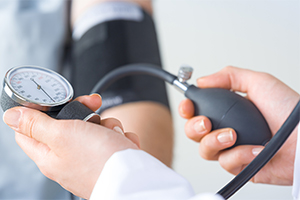 It’s no coincidence that May is both American Stroke Month and National Blood Pressure Month. They are inextricably related and calling attention to one calls attention to both. And we need to call attention to both high blood pressure and stroke.
It’s no coincidence that May is both American Stroke Month and National Blood Pressure Month. They are inextricably related and calling attention to one calls attention to both. And we need to call attention to both high blood pressure and stroke.
Why?
Strokes are the fifth leading cause of death in the United States and a leading cause of disabilities. And high blood pressure is the most controllable risk factor for strokes, so controlling blood pressure can help reduce the number of strokes Americans suffer each year.
What is high blood pressure?
If your blood pressure is over 120/80 you could have high blood pressure. One in three American adults have high blood pressure. One in six with high blood pressure don’t know they have it. High blood pressure often produces no symptoms, so it’s best to get it checked routinely.
What is a stroke?
A stroke occurs when a clot or rupture affects blood flow to the brain. Without oxygen rich blood flow, brains cells die. Depending on where in the brain the stroke occurs can affect the outcome and damage. Death or permanent disability are two possible outcomes of a stroke.
Who is at risk?
Risk factors for stroke include: high blood pressure, smoking, sedentary lifestyle, high calorie/high fat diet, diabetes, obesity, high cholesterol, heart disease, atrial fibrillation, and sickle cell disease.
What can you do if you are at risk?
Reduce your risk. Check your blood pressure, take medications as prescribed, improve your diet to include lean protein, fresh fruits and vegetables, and reduce sugar, incorporate activity and exercise in your lifestyle, reduce your blood sugar and HgbA1c, reduce your weight, see your doctor regularly and follow his or her advice.
If you are obese or overweight with significant comorbidities (such as type 2 diabetes, high blood pressure, high cholesterol, sleep apnea, heart disease, or vascular disease) you could be a candidate for bariatric surgery. Bariatric surgery is a proven method of weight loss and can also improve or eliminate comorbidities such as type 2 diabetes, high blood pressure, and high cholesterol. Don’t wait until it’s too late. If you or a loved one is interested in gastric sleeve, gastric bypass, or lap band surgery, call Dr. Shillingford’s office at (561) 483-8840 for an appointment for a free informational session. Weight loss can reduce blood pressure and reduce your risk of stroke. If you have been unsuccessful at losing weight on your own, you can lose weight with bariatric surgery.

 Am I A Candidate
Am I A Candidate  BMI Calculator
BMI Calculator  Why Choose Us
Why Choose Us